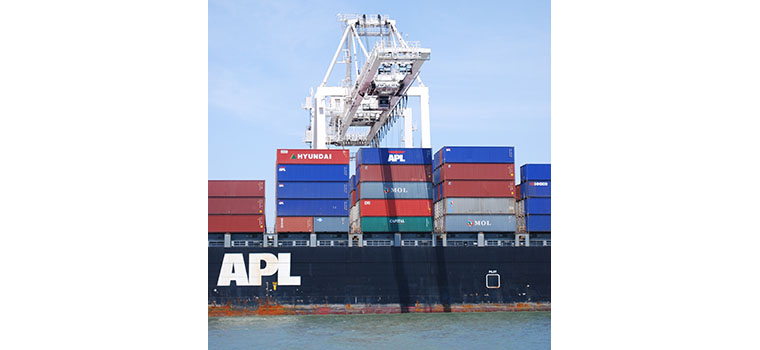San Francisco-based BSR created its Clean Cargo Working Group (CCWG) some time ago to address the ongoing need for reducing the environmental footprint of the world's merchant vessels.

A recent report shows that the global container shipping industry reduced greenhouse gas emissions by 2.4 percent from 2015 to 2016. Photo by Joel Williams
BY PATRICK BURNSON
Published: November, 2017
San Francisco-based BSR created its Clean Cargo Working Group (CCWG) some time ago to address the ongoing need for reducing the environmental footprint of the world’s merchant vessels. Last month CCWG issued a key report demonstrating that much progress has been made.
The report is based on emissions reported by more than 3,200 ships from 22 of the world’s leading ocean container carriers, representing 87 percent of the global ocean container shipping industry by volume.
The data show that the industry improved performance of greenhouse gas emissions by 2.4 percent from 2015 to 2016, a lower rate of improvement than in previous years. This highlights that performance continues to improve, but also demonstrates the critical importance of collaboration and collective action to enable shipping to contribute to global emissions reductions targets. This was also the first year that 100 percent of carriers included in the emissions factors were verified using CCWG’s procedure and guidance for verifying CO2 and SOx data.
CCWG has also reached a major milestone of 50 corporate members. The group now includes 22 container carriers and 28 of this industry’s largest customers—both global brands and freight forwarders. APL Logistics, CEVA Logistics, EFL, Expeditors International, LF Logistics, Panalpina Management, Philips Lighting and SAT Albatros all joined in 2017.
“Partnerships along the value chain are key to conducting business truly sustainably. In joining CCWG, we join a group of peers dedicated to accelerating sustainability in the container shipping industry,” said Nicola Kimm, head of sustainability at Philips Lighting, one of the new shippers to join in 2017. “Furthermore, we gain access to reliable and accurate data on individual carrier performance, enabling us to make better informed procurement decisions and drive down carbon emissions of our logistics.”
The group continues to foster environmental performance innovations for the sector, such as a pilot program by members Electrolux and Hamburg Sud to reduce pollution in ports. CCWG has also kicked off a materiality assessment to prioritize the most critical social, ethical and environmental impacts industry-wide that will help CCWG to set a vision for 2030 and a three-year agenda.
“CCWG provides so much more than relevant, credible data; it is also the forum to work collaboratively with our supply chain and other buyers to make progress,” said Tomas Dahlman, director of global energy strategies for Electrolux. “The group works on several innovative initiatives that enable us and the shipping industry to work more sustainably.”
Prologis Partners With Plug and Play to Support Supply-Chain Startups
Another San Francisco-based “working waterfront” leader is Prologis, which recently announced a strategic partnership with Plug and Play, a global startup ecosystem and venture fund specializing in the development of technology startups in the supply chain field.
Prologis will provide mentorship and space in its logistics real estate properties to a select group of startups in the Plug and Play accelerator program to pilot new technologies. Prologis joins DHL, Maersk, Panasonic, Hitachi, Mann+Hummel, CMA CGA, Daimler, Deutsche Bahn, Swiss Post, BASF, Union Pacific Railroad and Ericsson as partners with Plug and Play.
“Prologis will collaborate with startups and industry leaders—many of which are Prologis customers—to develop the next generation of supply chain technology,” said William O’Donnell, senior vice president of Prologis. “With our continued focus on streamlining operations to better serve our customers, we’re making strides in driving the future of logistics facilities.”
According to O’Donnell, this is reflected in the company’s leading-edge building features such as solar and lighting installations, and new building designs such as multistory facilities. “We look forward to exploring and integrating a range of new capabilities, including advanced analytics, Internet of Things (IoT) and other innovations within the supply chain.”
Saeed Amidi, founder and CEO of Plug and Play, noted that his company launched this new initiative to find new technologies for the supply chain. “This is one of the greatest opportunities for corporations to innovate and transform the future of the industry,” he said. “We’re excited to have Prologis join the program and to further support their innovation strategy.”
Patrick Burnson is the executive editor of Logistics Management. www.logisticsmgmt.com

